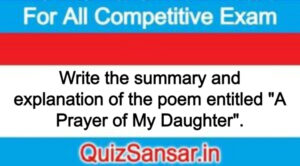
Write the summary and explanation of the poem entitled “A Prayer of My Daughter”.
Write the summary and explanation of the poem entitled “A Prayer of My Daughter”.
Ans.
Summary of the Poem
Yeats had written ‘The Second Coming’ (a poem) a month before the child was born. This poem ‘A Prayer for my Daughter’ should be read with the poem ‘The Second Coming’, because there is some similarity between the two poems. The poet is anxious to rescue his daughter from the wrath and tyranny of The Second Coming, the poem which suggests the end of the Christian era and the advent of a new barbaric age. The poet foresees the end of the present civilization which is “scientific, democratic, fast accumulating. heterogeneous civilization”. for in it there is anarchy and lawlessness. So the poet wants to save his daughter from many an evil of the present civilization. The poet is gloomy and anxious to protect his child from the wrath of the coming cruel tides; he prays to solicit for his infant child a life of beauty and innocence, of safety and security, without the cursed intellectual hatred and opinionated stubbornness. He does not want her to grow like Helen who was troubled by a fool, or, like Venus who married the lame ironsmith of the gods, Hephaestus. The reference is indirectly to Maud Gonne’s cruelty to the poet’s love. Maud Gonne married a fool, a lout named Mac Bride.
The poet prays to God that his little daughter may be granted ordinary beauty without pride, refined courtesy and enlargement of the soul. She may be free from the faults of drinking and quarrelling, and the evil called hate. She may also be free from empty pride which gives rise to intellectual hatred. It was because of her intellectual hatred that Maud Gonne ruined her life and prospects of happiness. Finally, the poet prays that his daughter may be married to a man belonging. To an aristocratic family which loves tradition, ceremonies, and courtesy.
EXPLANATIONS
1. Once more the storm is howling, and half hid
Under this cradle-hood and coverlid
My child sleeps on. There is no obstacle
But Gregory’s wood and one bare hill
Whereby the haystack-and-roof-levelling wind,
Bred on the Atlantic, can be stayed;
And for an hour I have walked and prayed
Because of the great gloom that is in my mind.
I have walked and prayed for this, young child an hour
And heard the sea-wind scream upon the tower;
And under the arches of the bridge, and scream
In the elms above the flooded stream
Imagining in excited reverie
That the future years had come,
Dancing to a frenzied drum,
Out of the murderous innocence of the sea.
Explanation with Reference to Context- These lines are from W. B. Yeats’s poem entitled A Prayer for my Daughter. Yeats wrote this poem soon after the birth of his daughter Annie Butler Yeats. There is nothing unusual about an affectionate father’s praying for the future prosperity and well-being of his child. However the poem derives an added significance and poignancy from the vision of approaching anarchy which the poet described in the prophetic poem. The Second Coming”. This explains the pet’s gloom mentioned in the first stanza of the poem.
The poet is in gloomy mood parity through his grave concern at the turbulence in society and partly through anxiety for the future of his newly born daughter, Annie Butler Yeats. He finds that this world in which she is born is growing harsher and harsher. The poet’s daughter sleeps quietly in her cradle, half-hidden under the cradle-hood and the coverlet. Outside, the storm is howling again. There are no barriers, except Lady Gregory’s wood and a bare hill, which can check the speed of the stormy wind coming from the Atlantic and pulling down hay stacks and house-roofs. Inside the poet’s mind, there also blows a storm of great gloom. The poet has walked’ and prayed for his infant daughter, for about an hour. He has heard the Atlantic wind howl outside his house in the Thoor Ballylee tower, under the arches of the stream bridge and also among the elms upon the hillside of the flooded stream. The storm has excited in him fear that the destructive future years have arrived at last. And they have come dancing to a maddening drum-beat, as if out of the dangerous calm of the Atlantic. So like an affectionate father he prays for his daughter’s safety in a world which is growing more and more unsafe and anarchic.
Critical Note : (1) Imagining…the sea Notice the fanciful, visionary nature of the poet : the storm beating upon the scene is compared to a wild dance of the future years.
(2) Murderous innocence an example of oxymoron (the just as position of incompatible or contradictory words). The sea is often murderous and destructive, but innocent because the destruction is not intentional.
(3) The violence of nature seems symbolic of a large violence, the ‘murderous innocence of the sea’. The image recalls the mere anarchy’ and the ‘blood-dimmed tide’ of The Second Coming. The poet also has in mind the world war, the Irish civil war and the inhumanity of the modern twentieth century world. In such a setting, how can this birth, the child in this cradle escape the nightmare violence to be born in Bethlehem when the rough beast of “The Second Coming” lies rocking where Christ had once been cradled?
2. May she be granted beauty and yet not
Beauty to make a stranger’s eye distraught,
Or hers before a looking-glass, for such,
Being made beautiful overmuch,
Consider beauty a sufficient end,
Lose natural kindness and may be
The heart-revealing intimacy
That chooses right, and never find a friend.
Helen being chosen found life flat and dull
And later had much trouble from a fool,
While that great Queen, that rose out of the spray,
Being fatherless could have her way
Yet chose a bandy-legged smith for man.
It’s certain that fine women eat
A crazy salad with their meat
Whereby the Horn of Plenty is undone.
Explanation with Reference to Context- These lines have been taken from Yeats’s poem. A Prayer for My Daughter. In this poem, Yeats prays to God to save his daughter from many an evil of the present civilization The poet foresees the end o the present civilization which is “scientific, democratic, fact-accumulating, heterogeneous civilization.” In this civilization there is anarchy and lawlessness. Therefore the poet is gloomy and anxious to protect his child from the wrath of the coming cruel tides.
Yeats prays to solicit for his infant child a life of beauty. He prays that his daughter should be gifted with beauty. But he does not want that this beauty should make his da9ghter proud and cruel. Generally, it happens that exceptionally beautiful women begin to regard beauty as a complete end in itself. They forget that beauty be conducive to the happiness of life, Beautiful proud women forget their natural feminine qualities, such as kindness and shyness. They fail to respond to the advances of even their sincere lovers. Therefore, they ultimately tail to find a suitable life-partner. Therefore, Yeats wants that his beautiful daughter should never be proud of her beauty. Yeats cites examples to explain his point. He gives examples from history and legend of beautiful women who suffered greatly. Helen of Tory was a great beauty. She found her life monotonous and dull. And later she bad much trouble on account of a foolish lover [called Paris] Likewise, the great beauty queen, Venus, who sprang from the foam of the sea, and who, being fatherless, could have her way choose a lame ironsmith for her husband. It is now evident that great beauties eat with their food such salad of pride as make them crazy. And by their craziness, their martial happiness is ruined. Thus the image of Helen evokes that of Venus, and her union with Hephaestus evokes the memory of the equally unsuitable Maud-Macbride Union. The past is thus linked-up with the present, and the personal with the impersonal. The scope of the poem is thus widened, and large vistas are opened to the mind’s eye. The poet-father does not want that his own daughter should be an extremely beautiful woman like Helen of 11oy. The poet’s own experience with Maud Gonne, make these lines doubly personal. The image of Helen evokes another figure Aphrodite who rose out of spray. The union of Aphrodite with Hephaestus, the bandy legged smith, leads at once to the Maud-Gonne McBride marriage. This makes the image cluster rich and complex.
Critical Note: These lines give examples of extremely beautiful women like Helen who not only suffered much but was the cause of much suffering to others and the Greek goddess Aphrodite who is supposed to have arisen from the sea but married a ‘bandy legged smith. Helen was bored and troubled by a fool and the ‘great queen repented after her marriage with ‘a bandy-legged smith. The poet thinks that beautiful women are silly (eat A Crazy salad) so that their happiness suffers. The poet, therefore, prays to God not to make his daughter so beautiful as to make her vain and proud. While making this prayer the poet has in mind the proud and obstinate Maud Gonne, and how, she rejected the poet’s passionate and devoted love.
-
Write the critical appreciation of the poem No. 12 entitled Far Below Flowed.
-
Write the critical appreciation of the poem No. 11 entitled Leave this Chanting.






